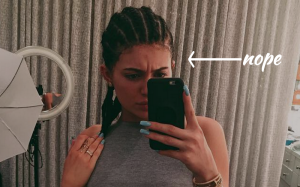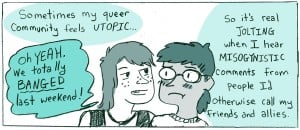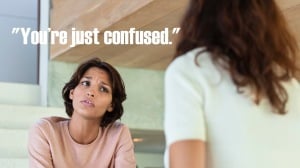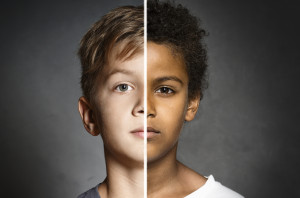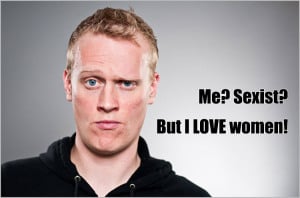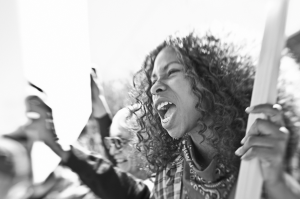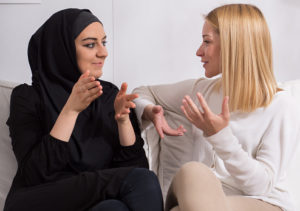
Two people engaging in conversation
The idea of a space where justice is a priority is amazing.
So, when Muslim women like myself enter feminist or social justice-oriented spaces, it is often our hope that these spaces will be amazing. But does it actually pan out that way?
I, for one, have had difficulty finding spaces where I’m not forced to explain myself; where I don’t feel like I’m supposed to be a representative for 1.5 billion people.
I think healthy discussions are great and vital, and I think conversations that make us uncomfortable often give us room to grow.
However, it is important that we start with a foundation that acknowledges the humanity of those in front of us and does not force anyone to prove their humanity.
Given my experiences, I came up with a list to help break down the different ways I’ve experienced microaggressions in feminist circles. I hope this list will broaden your understanding of the (beautiful) human complexity of Muslim women and shed light on how, sometimes, simple thoughts can lead to large gaps in communication and misunderstanding.
1. Having to speak on behalf of ALL Muslim women
“What do you think is important for us to know about the struggles of Muslim women?”
This is a real question that I’ve received multiple times. And while I think it’s important to acknowledge that our religious and political identities are under attack, Muslim women are not a monolith.
We, Muslim women, come from everywhere on this planet. This means we look different, speak different languages, have different religious and social identities, and relate differently to our faith and those around us.
How can I, a light skinned Arab Muslim girl, talk to you about ‘Muslim women’ as a singular experience when I’ve never been a Black Muslim woman? I’ve never experienced the racial violence of being isolated not only from society at large but even from the local masjid.
How can I speak to you of a struggle of an Uyghur ethnic minority woman in China when I know nothing of the unspeakable suppression she faces or how she navigates her faith and womanhood? How can I discuss the way Mexican Muslim women interpret and engage with their faith and culture?
My point in this is to say: because we are living in such a polarizing world, Muslim women in the US are often pressured into being a voice that speaks for too many different experiences. It is a burden we should not be forced to carry.
The next time you want to know how it is being a Muslim woman in an unwelcoming world, ask me about my experience. Ask me what I struggle with or what my biggest battle is. My answer might have nothing to do with my faith identity. Or it could have everything to do with it.
Bottom line, asking one person to speak for an entire community is pressuring, exhausting, and isolating. My experiences are simply mine and I cannot possibly speak for millions of other women.
2. Being told “We should all unite as women against Trump”
Possibly, a lot of readers aren’t thinking about this anymore. However, the recent election season helped to cement the reason why I generally reject Western feminism.
During this time, I was told by several white women that, ‘as women,’ we needed to unite against a ‘greater evil’ and support Hillary Clinton. I was asked to admire her resilience and courage and respect how hard she had fought to come so far in the presidential election.
And yet, I could not understand why I was expected to support someone who endorsed racist domestic and foreign policies.
I will never understand how, for so many people, Hillary’s identity as a woman overrides the white privilege that enabled her to rise to power and, subsequently, make so many people’s lives hell.
Why should I, a brown Muslim woman, be expected to forgive Clinton’s flaws — flaws that resulted in the loss of people’s lives — simply because she’s a woman?
On the campaign trail, Trump talked a lot of despicable talks, but Hillary had already walked a lot of horrifying walks and, yet, so many seemed to forget it.
I did not vote in the election and I told my white feminist colleague that I did not. She asked me if I felt guilty knowing that Trump won. I said, “No, I don’t because my feminism is built on the foundation of my humanity.”
I have had numerous conversations about Hilary’s policies with many white feminists. Each time, I have explained how these policies have directly impacted my community and, still, I was forced to hear just how amazing and brave they thought she was.
And yet, to repeatedly lay out my humanity only to have it dismissed was not shocking. Ultimately, feminist spaces are white, privileged, and racist, and so they will remain unless more people are willing to work on acknowledging that there is more to feminist struggles than gender identity.
3. Being forced to demystify the hijab
Everyone I have met has a unique and individualized reason as to why they wear the scarf.
They range from the beautiful to the ugly, and that’s okay.
They range from the political to the religious to the cultural — that’s also okay.
Muslim women do not wear the hijab on a spectrum that starts at ‘the headscarf is liberating’ and ends with ‘the headscarf is oppressive.’ We are not a celebration of choice when it is also polarized by modest and skimpy. Women’s choices are not linear.
The journey of wearing the hijab is deeply personal and I cannot speak for anyone but myself as to why I wear it.
When we cease to see the hijab as existing through a litmus test or a linear comparison to other choices, we can start having more nuanced conversations about the different experiences women have wearing it. We can be more open to each woman’s reflections on the physical and metaphysical relationship they have with it.
Some of us choose to wear the headscarf and some of us don’t and that, too, is not linear.
4. Having to denounce violence in religious context
Multiple times, I have been asked, in subtle ways, to speak of a violence that is assumed to be ‘mine’.
Whether it is the Taliban in Pakistan and Afghanistan, ISIS against Yazidi women in Iraq, Boko Haram in Nigeria, or Saudi Arabia’s policies, I am constantly forced to clarify the socio-political existence of these groups.
In Western feminist circles, the idea that still prevails is that these entities exist as ‘one’ understanding of Islam as opposed to ‘our’ understanding of Islam.
This also suggests that religiosity is on a linear spectrum, stripping away so many of the historical realities that helped to create these groups and regimes.
For instance, the United State’s hand in creating the Taliban and supporting the current Saudi regime helped create the violence and suppression that women are subjected to in these locations.
If you, as a white feminist, are not asked to explain police brutality, colonialism, the occupation of Iraq, the imperialism of the US as a spectrum of your whiteness, then you should not ask me about the violence of groups from various different countries as a spectrum of my Islam.
5. Receiving literature and film recommendations on honor killings and FGM
“I thought of you, Hadiya. Did you watch the Oscar nominated film A Girl in the River? It’s a powerful film out of Pakistan about honor killings, you should check it out, I think you’d enjoy it.”
I don’t know what reminded her of me. I am not from Pakistan. I had never spoken to her about honor killings. However, apparently, I am a walking billboard encyclopedia for all oppressed-women-of-the-brown-world.
Apparently, being a vocal activist means I MUST be an expert on these topics since, apparently, they’re relevant to my life, right?
I do care about eliminating honor killings and female genital mutilation (FGM). I am outraged when these atrocities occur. However, I do not have a Google alert set on my phone for each time the news reports on these issues.
I do not need to watch films or documentaries or read books catered to a white gaze to understand the pain these actions leave behind. I do not need to explain the pain or the fights to a white audience, nor do I need to give them my feedback once I am reminded of such acts of violence.
I am not obligated to be up to date with all the recent news about violence against women in the ‘Muslim world,’ especially when the sound bites and articles are meant to shock people who didn’t care about Pakistani or Afghan women when they were victims of U.S drones or missile attacks.
***
Ultimately, one of the most crucial ways to recognize someone’s humanity is to acknowledge and accept the existence of unique and individualized narratives.
I am not writing this in hopes that I will be welcomed into spaces that were not created for me.
I am writing this because I hope it will serve as a reminder to those on the margins of these movements: you are not alone.
[do_widget id=’text-101′]
Hadiya Abdelrahman is an Everyday Feminism Reporting Fellow. Hadiya graduated from Rutgers University with a double major in Women and Gender studies and Middle Eastern Studies. Hadiya currently works with refugees and asylees in NYC. When she’s not at work, Hadiya writes angry rants and poetry. She enjoys writing about topics that focus on refugees, intersectional feminism, and state violence against people of color.
Search our 3000+ articles!
Read our articles about:
Our online racial justice training
Used by hundreds of universities, non-profits, and businesses.
Click to learn more







